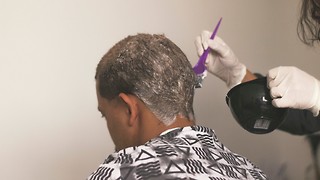TV Round-Up: The Replacement
Isobel Leigh finds this new psychological thriller a programme of two halves, the second one well worth a watch

We’ve all been there. We’ve all met that one person who seems great at first but after a while is slightly too overbearing. Let’s be honest, that person is every student during Freshers’ Week – asking question after question and trying to prove themselves as a prospective friend. But fortunately for us, this keenness doesn’t last too long and the initial excitement usually (and hopefully) subdues after a few days.
In BBC’s The Replacement, Ellen (Morven Christie) becomes pregnant after securing a promotion at her architecture company. Her cover, Paula (Vicky McClure), arrives and immediately has this chipper and optimistic attitude which permeates different aspects of Ellen’s life and does not cease. Some of the first interactions between Ellen and Paula are quite predictable and almost corny. It felt unrealistic when Paula, who from her interview we saw as capable and clearly apt for the position, pulls out the architecture plans in the middle of a restaurant. More comical was Paula’s constant touching of Ellen’s pregnant belly, which I imagine would be an invasion of privacy for most people, let alone a Brit who had only met her colleague a few months prior.
“the programme initially lacked the creepy, thriller sensation I had hoped for”
Whether Paula is indeed manipulating those around her to replace Ellen or whether it is just Ellen’s paranoia is for the viewer to decide. Paula plants worries about the pregnancy in Ellen’s mind, changes projects without consulting Ellen and gives an intimidating image of the work-life balance. However, we see the interactions from both Paula’s and Ellen’s perspective. Depending on the viewer, Ellen could seem vindictive and antifeminist, rejecting Paula’s innate confidence and professionalism. However, it is equally plausible that Ellen is justifiably resistant and defensive, with Paula craftily calculating Ellen’s descent into heightened paranoia about her professional and personal status.
While this sense of perspective is well executed, the programme initially lacked the creepy, thriller sensation I had hoped for. The likeness to the Single White Female storyline is hardly groundbreaking with The Roommate and even a plot in 90210 recreating ‘she wants to be me’ threat with a more consistent and eerier tone than the BBC drama. Watching The Replacement, there was a sense that the thriller genre had been overridden in order to tick the boxes of feminism, ensuring that each point about maternity leave was addressed by a different character in an pronounced and lacklustre way. These significant issues could have been implied in subtler and more effective ways, creating more depth and discussion about this topic rather than slapping the viewer in the face with it.
“Watching The Replacement, there was a sense that the thriller genre had been overridden in order to tick the boxes of feminism”
Yet, these issues were forgiven as the latter half of the show provided everything the beginning lacked. Suspense and ominousness were rife at the end of the episode with a cliffhanger ending prompting an alluring mystery set to unfold in the following two episodes of the series. This aspect leads the programme away from the its early predictability and turns it into a potentially complex and layered show, creating intrigue and a spark which goes beyond just a plain office drama.
Although a slow starter, The Replacement redeems itself by the end of the episode and asserts itself in filling the gap that Doctor Foster left. It will easily hold onto this status so long as the future episodes continue to pursue the harrowing atmosphere cast by the first episode's ending and forget the awkward and uninspiring first half. If not, the eagerness to watch a new episode will fade as quickly as did the thrill of Freshers’ Week
 News / Uni welcomes new students14 August 2025
News / Uni welcomes new students14 August 2025 Features / The community Cambridge accommodation creates (and doesn’t)9 August 2025
Features / The community Cambridge accommodation creates (and doesn’t)9 August 2025 News / Trinity sells O2 Arena lease for £90m12 August 2025
News / Trinity sells O2 Arena lease for £90m12 August 2025 Features / Incoming freshers and their hopes, fears and expectations for Cambridge 12 August 2025
Features / Incoming freshers and their hopes, fears and expectations for Cambridge 12 August 2025 News / Local group objects to ‘bulky’ new Christ’s library13 August 2025
News / Local group objects to ‘bulky’ new Christ’s library13 August 2025









